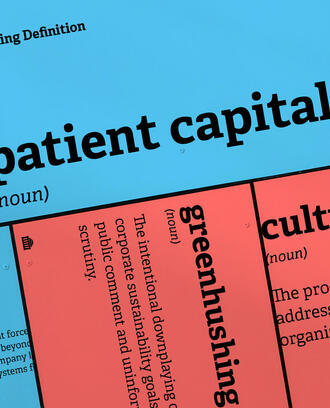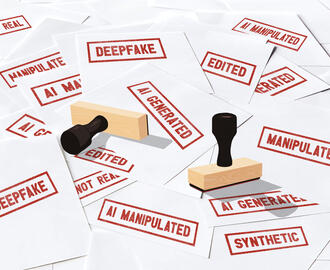Credit: Mimi Phan / Lev Radin / Shutterstock
Earlier this month, the Norwegian Nobel Committee awarded the 2021 Nobel Peace Prize to investigative journalist Maria Ressa, whose digital news company Rappler has exposed government corruption in the Philippines.
Ressa won the award with Russian journalist Dmitry Muratov, co-founder and editor-in-chief of the independent newspaper Novaya Gazeta. The two won for their “efforts to safeguard freedom of expression, which is a precondition for democracy and lasting peace,” the committee wrote in their prize announcement.
In addition to exposing authoritarianism in the Philippines, Ressa, a digital fellow at the MIT Initiative on the Digital Economy, has “documented how social media is being used to spread fake news, harass opponents, and manipulate public discourse,” the prize committee wrote.
At The Social Media Summit @ MIT in April, Ressa discussed her legal struggles, the way she’s seen social media used to spread misinformation in the Philippines — including how the government has weaponized it against her — and why U.S. lawmakers should hold social media platforms accountable.
“We have coronavirus in the real world. Here, in the information ecosystem, you have the virus of lies,” she said. “In some ways, you can say that the virus of lies coming is worse because you don't see it, you don't feel it, it changes your worldview, and it makes you impervious to facts. Our societies are going to have to fix this.”
“In order to keep doing my job, I’ve had to post bail”
Ressa, a former CNN journalist, founded Rappler in 2012. The news site has been critical of Philippine president Rodrigo Duterte, exposing his violent war against drugs that has killed more than 12,000 people, according to Human Rights Watch. As a result, Ressa and other Rappler journalists have faced threats and legal action from the government, which Ressa and others have said is an effort to silence critical press.
Duterte has called Rappler “fake news” and has said it is owned by Americans, a claim that is false. In 2018 the government announced it was revoking the news organization’s license to operate. Ressa said she’s seen the government start a narrative on social media with “exponential attacks” against herself and Rappler.
“In my case, the meta narrative that was seeded in 2016 is, ‘Journalist equals criminal,’” she said.
This has resulted in real-world consequences for Ressa. In the last two years, the Philippines government has filed more than 10 arrest warrants against her, and she has nine ongoing legal cases. “In order to stay free, and to keep doing my job, I've had to post bail,” she said. In 2020, she was found guilty for cyber libel for a story that was published in 2012.
Documenting the spread of online disinformation
In addition to attacks on journalists, Ressa and others have documented how Duterte and the Philippine government have used social media — especially Facebook — to spread disinformation and false narratives, including in their war on drugs.
“We really have documented disinformation, networks of disinformation,” she said, calling the government’s actions “insidious manipulation.”
MIT researchers, including MIT Sloan professor Sinan Aral, have found that lies travel faster than the truth on social media, and Facebook is especially popular in the Philippines — in 2017, 97% of the country’s internet users were on Facebook. “Facebook is our internet. Rappler began on Facebook,” Ressa said. This misinformation “pounds you to silence, and then it creates a bandwagon effect, makes other people believe that this is a fact,” she said.
“It’s not unique to us,” she said, noting that similar methodology has been used to advance a narrative about election fraud in the United States. “I think it's that it's happening in every democracy around the world where social media delivers the news.”
Facebook algorithms often treat social media manipulation by politicians the same as real grassroots movements started by people, Ressa said. “Real people who are on social media can't tell the difference, and that has led to the reason why real people are being manipulated,” she said, such as the people who stormed the U.S. Capitol in January because of a false narrative about a stolen election.
What U.S. lawmakers and social media companies should do
It is incumbent on U.S. policymakers to take action, Ressa said.
“These are American companies,” she said. “It ripples to us, and it is the countries in the global south that pay the worst price for the excesses of American companies. So, look, I appeal for help on this because, partly, how fast you move will determine whether or not I go to jail.”
Related Articles
In the physical world, she noted, it is illegal to yell “fire” in a crowded theater, or “bomb” in an airport. “Well, people do this all the time on social media, with impunity,” she said. “That is actually both on the social media platforms and on governments who are also taking part in the information operations.”
“Let's take the real-world laws and bring them into the virtual world,” she said. Ressa also issued a plea for rationality.
“That's what journalism is. It's actually rational, and we're rationally giving you different perspectives. But social media is not. It's emotional, manipulates your emotions,” she said. “We have to find a way forward that doesn't kill our democracies.”
Before any government action, social media companies should be held accountable for the way they have been designed to amplify certain content. “It's a problem of reach. It's not about freedom of speech,” she said.
She also called on social media companies to do three things:
- Admit that they have helped create this disinformation problem.
- Stop treating data equally. “Fact and fiction, lies and facts, are identically treated as data, and the way the algorithms work is it actually prioritizes the spread of the lies,” Ressa said.
- Acknowledge the importance of truth. “It’s enlightened self-interest, to understand that by watering facts down, [allowing] the lies to spread faster, without facts, we have no shared reality,” she said. “So you have no facts, you have no truth, you have no trust.”
“Without these three, you cannot have democracy, let alone solve the existential problems that we're facing in the world,” Ressa said.
Read next: 25 ways to fix social media



